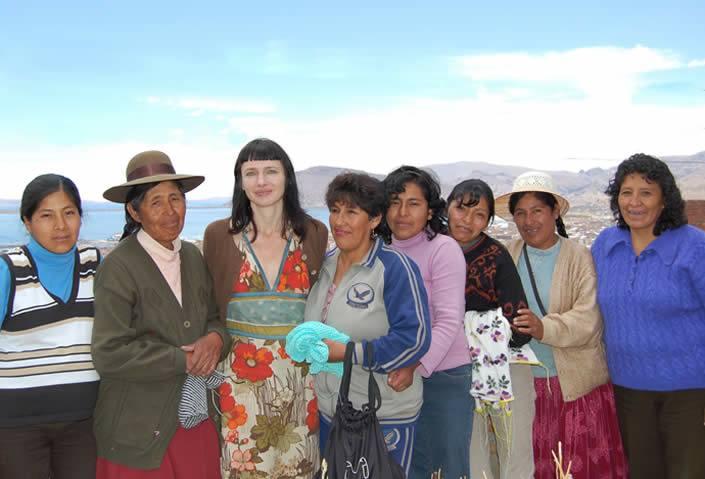
In the second of our series Can Beauty be Benign, writer Holly Dawson talks to Carry Somers, founder and M.D. of Pachacuti, about what it means to run a truly ethical business.
There’s ethical fashion – and then there’s Pachacuti. The Derby, England-based label was one of the original Fair Trade trailblazers back in 1992 and remains the only ethical producer of genuine Panama hats. Since then, it has continued, as its name translates, to turn the "world upside down." It was the first company globally to have its entire supply chain audited and approved by the World Fair Trade Organization's SFTMS certification.
This is all due to founder and M.D., Carry Somers, whose determination and vision has seen the company thrive through recessions, death threats, armed robbery and Ecuador’s changing socioeconomic landscape.
Somers’ next groundbreaking project is Fashion Revolution Day, launched to mark the anniversary of the Rana Plaza disaster on April 14. To find out more, visit Fashion Revolution or follow @Fash_Rev on Twitter - where you can ask the question, "Who made my clothes?"
We caught up with her at Estethica at London Fashion Week, where Pachacuti was showcasing its new collection, including Panamas influenced by utilitarian servicewear and a new line of ethical fascinators.
Holly Dawson: Carry, you have been in the industry for so long. What advice do you have for upcoming ethical businesses and fashion companies?
Carry Somers: Firstly, I think it’s really important to show other designers that it is economically viable to have an ethical business. We have been going for 21 years, and we have always been profitable. Secondly, when it comes to Fair Trade or similar approaches, you must remember it is not a destination – it’s a process. We are constantly working to make our process more robust, beyond criteria or ticking boxes.
HD: Do you have an example of that?
CS: We recently plotted the GPS coordinates of every weaver, so you can actually see on the map where each hat was made. This was no mean feat, especially considering only 45 percent of the homes are accessible by boat. People talk about traceability – that’s what it meant to us.
HD: What’s most critical for your ethos – people or planet?
CS: People or planet? You can’t separate them! Although there is a common perception that Fair Trade is just social, not environmental. It has been stigmatized through some of the more well-known examples of Fair Trade, such as Fair Price coffee. There’s a real lack of understanding that Fair Trade actually covers 10 principles, of which environment is one.
HD: How does that influence the design process, compared with mainstream fashion companies?
CS: We have to be very much producer- and production-led, whereas other designers can be more fashion-focused. We have long lead times and can’t be so responsive to trends. It’s an advantage that we specialize in a classic item, but there are things we want to try sometimes, like the new fascinator collection, where we just have to be more patient than other designers.
HD: So how much of what you do is decided by the producers themselves?
CS: Almost everything. We do regular surveys with all our weavers to find out their time and expertise level, and that influences what we can make. For instance, we know from speaking to the women that they can weave coloured hats faster than plain ones, because of their poor eyesight and because they are often working at night. This also means it is easier for them to produce lower-grade hats. We are led by their capacity.
HD: Does this ever cause difficulties?
CS: The women are getting older – the average age of our weavers is now 56. Volume is also limited by the number of people in the association – an increasing issue, because fewer people have, or want to use, these traditional skills.
HD: How do you deal with that?
CS: We need to bring in more young people to keep the industry alive, but young people dream of migrating to America. They pay extortionate loans to coyotes believing they will get to the U.S. We are working with communities to create more incentives to stay, especially now [that] UNESCO has designated the craft of Panama hat-making an Intangible Cultural Heritage.
HD: What are your other main challenges?
CS: The challenge of Fair Trade is really the management aspect of our producers. The women's organizations are democratic, which results in a lot of change of management, meaning we lose all our orders and have to start from scratch. You know it’ll happen every year, sometimes less. It’s hard to put plans in place.
HD: How do you tackle that?
CS: We are trying to teach about the importance of continuity. We know a new administration is starting in January, so we have developed a manual with pictures, which shows you where to go for everything. For example, new hat blocks, this is the taxi driver that will take you to this place, etc.
HD: How do you handle the 'profit' part of the triple bottom line?
CS: I am just very careful about how to spend money. Starting in a recession [in 1992] makes you very conscious of money. I do all the accounting myself. I keep our costs to a minimum – we use public transport, for instance – but all our employees are paid really well and are happy in their work. Ultimately, all the money goes back into production.
Holly Dawson is editorial director of Ethical SEO, a digital communications consultancy based in the heart of the English countryside. She spends her days supporting good people to do interesting things online and thrive in the connection economy.
TriplePundit has published articles from over 1000 contributors. If you'd like to be a guest author, please get in touch!














